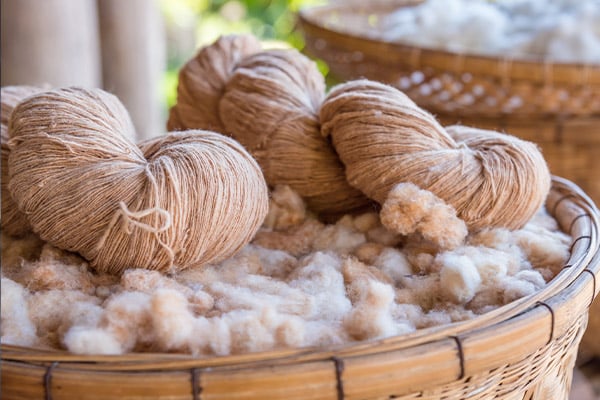Goonvean Fibres has a workforce that strives to create quality fibres in an eco-friendly way. Our economically sound processes enable us to manufacture natural and synthetic fibres for industries worldwide, to help them manufacture environmentally friendly products.
If you’re a manufacturer looking to create more eco-friendly products, we’ve put together our top 10 fibres and powders to help.
1. Jute
Jute is a strong, soft, and shiny bast fibre made from flowering plants. Spun into long, coarse threads, jute has multiple uses. Also known as the ‘golden fibre’ due to its colour, cost-effectiveness, and flexibility, the fibre is popular for a range of manufacturing processes.
2. Sisal
Extracted from the leaves of sisal plants, sisal is an environmentally friendly fibre due to its biodegradable properties and the fact that no pesticides or fertilisers are used to cultivate it. The plant fibre is durable and is commonly used to manufacture paper, footwear, rope, twine, carpets and much more.
3. Coir
Coir is a natural coarse fibre extracted from the outer shell of a coconut. The eco-friendly fibre is highly resistant to moisture, durable, hardwearing, and resistant to mechanical and chemical abrasion. It is also one of the few natural fibres resistant to saltwater.
There are two types of coir, white and brown. White coir fibres are smooth and fine, commonly spun to make yarn. Brown coir is harvested from fully ripe coconuts. It’s thicker and stronger, perfect for making products such as mats and brushes, for example.
4. Hemp
Extensively used throughout history, hemp is a durable and highly tensile bast fibre that comes from one of the fastest-growing plants alongside bamboo. Hemp is one of the most sustainable fibres that come from the same species of plant as marijuana. It has a high market value and is often used to manufacture fabrics, paints, inks, building products, paper, plastics, fuels, and even clutch pads.
5. Viscose
Viscose is an eco-friendly synthetic fibre made from natural sources of regenerated cellulose, making it 100% biodegradable. Viscose is used for several applications, including the packing industry. It is FSC approved and has many benefits, from high density and tensile strength to non-melting and homogeneous dispersion. The fact it is extruded means thick diameters are available, giving high fibre tensile strength where precision cut lengths are possible.
6. Cotton
Cotton is an absorbent, breathable, and soft fibre that can withstand abrasion wear and high temperature. The biodegradable fibre is naturally hypoallergic and anti-inflammatory, hence why it is has been used to manufacture textiles for centuries. Fibres from cotton plants are found in Africa, the Americas, Egypt and India, and are spun into yarn or thread to make breathable textiles.
7. Fruit Stones
Fruits have been used for applications for thousands of years. Fruit stone powders and grits are an excellent solution to manufacture quality face and body scrubs, household applications and more. It’s an eco-friendly and sustainable alternative to microplastics that is cosmetics approved and perfect for abrasive applications.
8. PLA
PLA (polylactic acid fibres) are eco-friendly thermoplastic, non-toxic fibres derived from plants. It’s the most eco-friendly plastic we produce that is hypoallergenic, biodegradable and recyclable. The fact it is a plastic (unlike most natural products) means it retains its properties across a range of harsh environments, including when subject to wetting!
9. Silk
Silk is a natural fibre that comes from animals. It’s the strongest natural textile in the world, with a luxurious reputation for its super soft and cooling properties. Silk consists mainly of fibroin – protein insects produce to make cocoons or webs. However, most of the silk we use derives from worms that inhabit mulberry trees. It can be used for endless applications and is environmentally friendly due to its nature.
10. Cellulose Acetate
Our cellulose acetate is modified to be a biodegradable polymer that’s heat resistant, non-toxic, and 100% biodegradable. It’s made with renewable resources and consists of natural polymer cellulose modified with acetyl groups. Applications include adhesives, glasses frames, x-ray films and more.
Find out more about the properties of some of the fibres and powders above in the table below. For more information on our eco-friendly fibres and manufacturing processes, contact us.


